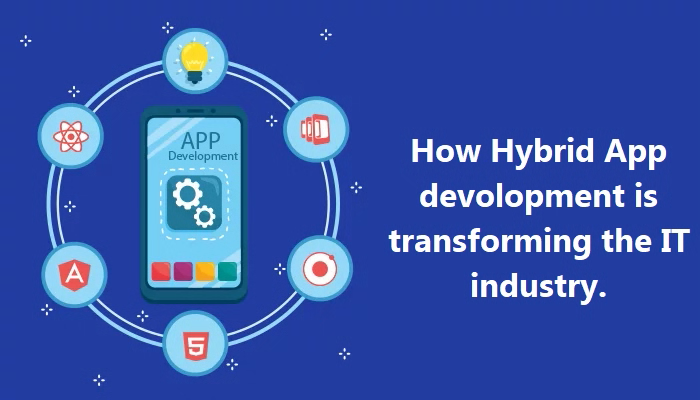
How Hybrid App devolopment is transforming the IT industry.
What is Hybrid app development ?
Hybrid app development is a methodology that allows developers to create applications that can run on multiple platforms, such as Android, iOS, Windows, and others, using a single code base. This approach is very attractive for the IT industry, as it can reduce development time and cost, increase productivity and efficiency, and reach a wider audience.
Technologies used in Hybrid app development:
Hybrid app development uses frameworks that can target different platforms using web technologies such as:-
- HTML
- CSS
- JavaScript
popular frameworks for hybrid app development are:
- React Native
- Ionic
- Ionic
- Xamarin
- Flutter
- Cordova
These frameworks enable developers to leverage native features and functionalities of each platform, such as camera, GPS, push notifications, etc., while maintaining a consistent user interface and user experience across devices.
Advantages of Hybrid app development:
Faster time to market:
Developers can build and deploy applications faster using a single code base, rather than creating separate versions for each platform. This can also facilitate updates and maintenance of the applications.
Lower development cost:
Developers can save resources and money by using existing web technologies and skills, rather than learning new languages and tools for each platform. This can also reduce the need for hiring or outsourcing specializeddevelopers for each platform.
Wider reach and accessibility:
Developers can reach more users and customers by making their applications available on multiple platforms and devices. This can also improve user satisfaction and retention rates.
Improved performance and functionality:
Developers can leverage the native capabilities and features of each platform, such as hardware acceleration, offline access, etc., to enhance the performance and functionality of their applications. They can also use plugins and APIs to access additional functionalities and services.
challenges and limitations:
1.Compatibility issues:
Developers may face compatibility issues between different platforms, devices, browsers, and versions. They may also encounter bugs and errors due to differences in native APIs and libraries. This may require more testing and debugging efforts to ensure quality and reliability of the applications.
2.Reduced native look and feel:
Developers may have difficulty in creating applications that match the native look and feel of each platform. They may also face limitations in customizing the user interface and user experience according to the platform standards and guidelines. This may affect the user engagement and satisfaction levels.
3.Performance trade-offs:
Developers may have to compromise on some aspects of performance, such as speed, responsiveness, memory usage, battery consumption, etc., due to the use of web technologies and frameworks. They may also face challenges in optimizing the applications for different screen sizes, resolutions, orientations, etc.
Conclusion:
Therefore, hybrid app development is a promising methodology that can transform the IT industry by enabling developers to create cross-platform applications with ease and efficiency. However, it also requires careful planning, design, testing, and optimization to ensure quality and success of the applications.
